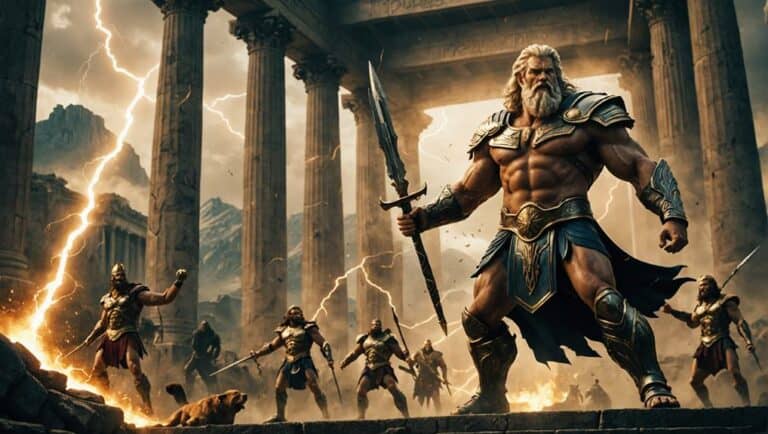Discover the captivating myths of ancient Greece, where gods like Zeus command the skies and heroes such as Hercules conquer formidable feats.
From Odysseus's epic journeys to Prometheus's cunning, delve into stories that have shaped Western art, literature, and philosophy, revealing timeless human virtues and flaws.
Origins of Greek Mythology
Rooted in the rich oral traditions of ancient Greece, Greek mythology is a tapestry of stories that began as explanations for natural phenomena, religious beliefs, and historical events. These myths, woven through centuries, reveal the ancient Greeks' profound attempts to understand their world. They crafted narratives filled with gods, heroes, and supernatural entities, each embodying unique aspects of human experience and the environment.
The stories, initially passed down through generations by word of mouth, held immense cultural significance. They weren't just entertainment; they were a means to impart moral lessons and explore human nature. Myths about deities like Zeus, Hera, and Athena, and legends of heroes such as Hercules and Perseus, encapsulated the ancient Greeks' values, fears, and aspirations.
This oral tradition ensured that these tales were told and retold, evolving over time before being immortalized in written form. The myths acted as a communal memory, binding people with shared beliefs and historical context.
Even now, the influence of Greek mythology permeates literature, art, and popular culture, demonstrating the enduring power of these ancient stories. Through these myths, you gain a glimpse into the minds and hearts of a civilization long past.
Major Olympian Gods
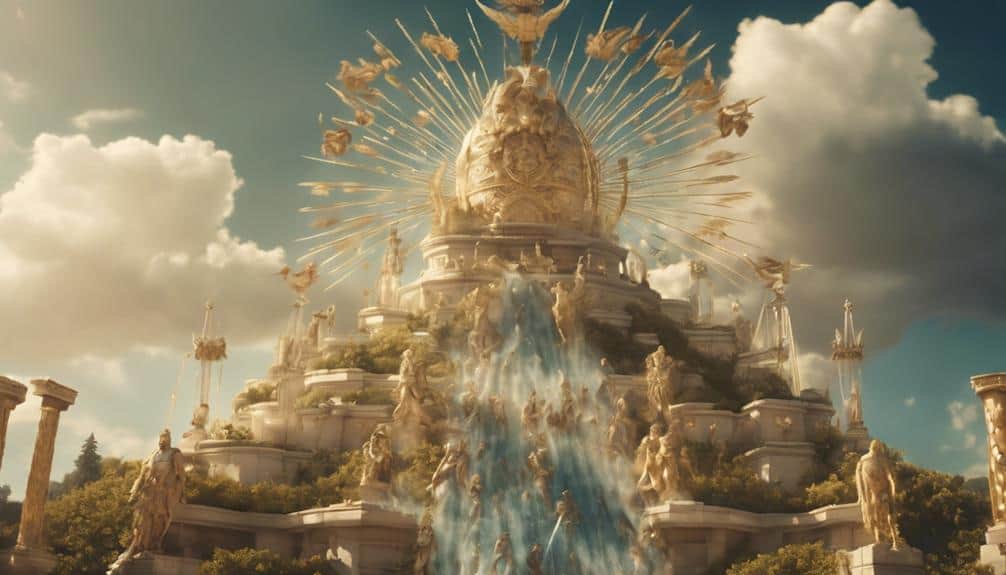
The pantheon of the major Olympian gods, each embodying distinct facets of existence and human endeavor, forms the cornerstone of Greek mythology. At the summit, you'll find Zeus, the king of the gods, wielding his thunderbolt with authority. His wife, Hera, stands beside him as the queen, overseeing marriage and family.
Poseidon, as the god of the sea, controls the oceans' vast expanse, while Demeter, the goddess of agriculture, safeguards the fertility of the earth.
Athena, the goddess of wisdom and warfare, symbolizes strategic prowess and intellect. Her brother Apollo, the god of the sun and music, brings light and harmony to the world. Artemis, Apollo's twin sister and the goddess of the hunt, represents wilderness and the moon. Ares, the god of war, embodies the brutal and chaotic aspects of conflict.
Hephaestus, the god of fire and craftsmanship, creates magnificent weapons and artifacts, underscoring the importance of skill and labor. Aphrodite, the goddess of love and beauty, inspires passion and desire among gods and mortals alike.
These deities, residing on Mount Olympus, profoundly influence both the divine and mortal domains within Greek mythology.
Legendary Heroes
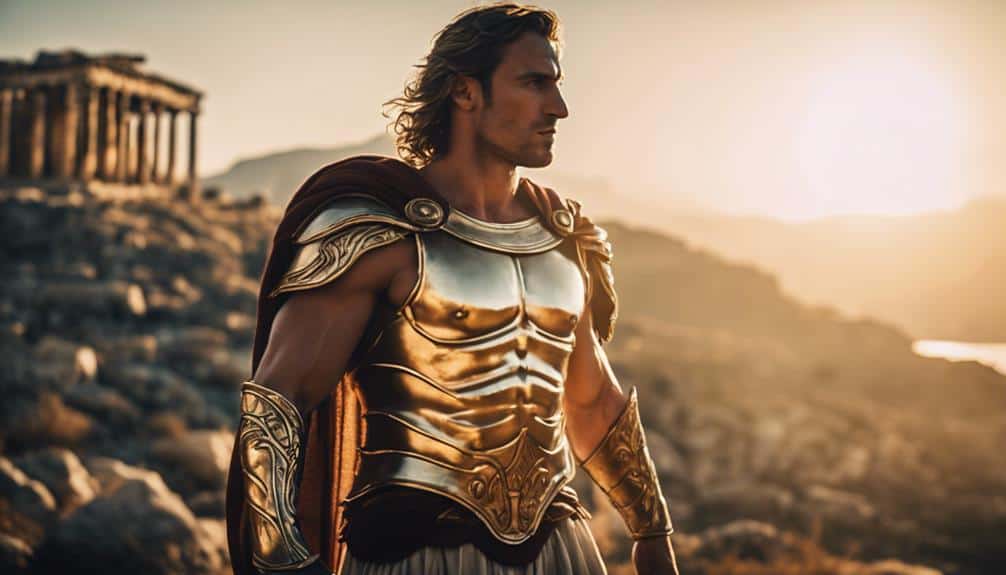
As you explore Schwab's retelling, you'll encounter the iconic feats of heroes like Heracles and Jason, whose adventures are rich with trials and tribulations.
Each hero's journey isn't just about their battles but also the legacy they leave behind, shaping the very fabric of Greek mythology.
Iconic Heroic Feats
Hercules' twelve labors, Theseus' journey through the labyrinth, Perseus' defeat of Medusa, and Achilles' prowess in the Trojan War each illustrate the extraordinary feats that define Greek mythology's legendary heroes. These iconic feats aren't just remarkable stories; they're the backbone of ancient Greece's rich tapestry of heroic challenges. Each hero's journey showcases moral virtues—courage, determination, and honor—allowing the triumph of good over evil to resonate powerfully.
In Greek mythology, heroes like Hercules and Theseus are legendary figures whose actions reveal timeless themes. Hercules' labors, such as slaying the Hydra and capturing the Golden Hind, aren't mere tasks; they symbolize the struggle for redemption. Similarly, Theseus' navigation through the Minotaur's labyrinth represents the journey of self-discovery and bravery.
Perseus' defeat of Medusa, using intellect and divine aid, underscores the importance of wit and resourcefulness. Achilles, with his unmatched prowess in the Trojan War, embodies the warrior spirit and the tragic cost of pride. These stories don't just entertain; they offer enduring impact, reflecting human experiences and aspirations.
Heroic Trials and Tribulations
While the heroic deeds of Greek mythology's legendary figures showcase their triumphs, it's equally enlightening to explore the trials and tribulations that tested their resolve and defined their heroic narratives.
Iconic Greek heroes like Hercules, Achilles, and Perseus faced legendary trials that highlighted their bravery and heroism. Hercules, renowned for his strength, endured the Twelve Labors, a series of nearly impossible challenges, to atone for his past transgressions and achieve glory and honor.
Achilles, the formidable warrior of the Trojan War, grappled with not only formidable enemies but also profound personal struggles. His quest for glory was marred by moral dilemmas and the foreboding knowledge of his own fate, showcasing the complexities of heroism.
Perseus, another legendary figure, set off on a perilous quest to slay Medusa, navigating a world filled with gods and monsters. His triumph in this challenge was a proof of his bravery and cunning.
These heroes' journeys weren't just about their heroic feats but also about the moral and personal challenges they faced. Their stories offer a fascinating glimpse into the ancient Greek concept of heroism, where glory and honor were earned through unwavering resolve and sacrifice.
Heroism and Legacy
The enduring legacy of Greek mythology's legendary heroes lies in their extraordinary exploits and the timeless values they embody, which continue to resonate through literature, art, and popular culture.
You'll find that the heroes of ancient Greece, like Hercules, Achilles, Perseus, and Odysseus, represent more than just mythical legends; they encapsulate the interpretive nature of human experience and morality. Their epic quests, battles against formidable monsters, and interactions with gods and goddesses not only entertain but also offer profound insights into human resilience, bravery, and ingenuity.
By examining this collection of heroic tales, you can appreciate how these stories symbolize the triumph of good over evil and the perseverance of the human spirit. The historical accuracy of these myths may be debatable, but their impact remains undeniable.
This enduring power of myth is reflected in how these legendary heroes continue to inspire a vast array of creative expressions, from classical sculptures to modern films.
Understanding the legacy of these heroes helps you grasp the cultural and psychological significance they held for ancient Greeks and how they continue to influence contemporary narratives, embodying universal themes that transcend time.
Iconic Mythological Tales
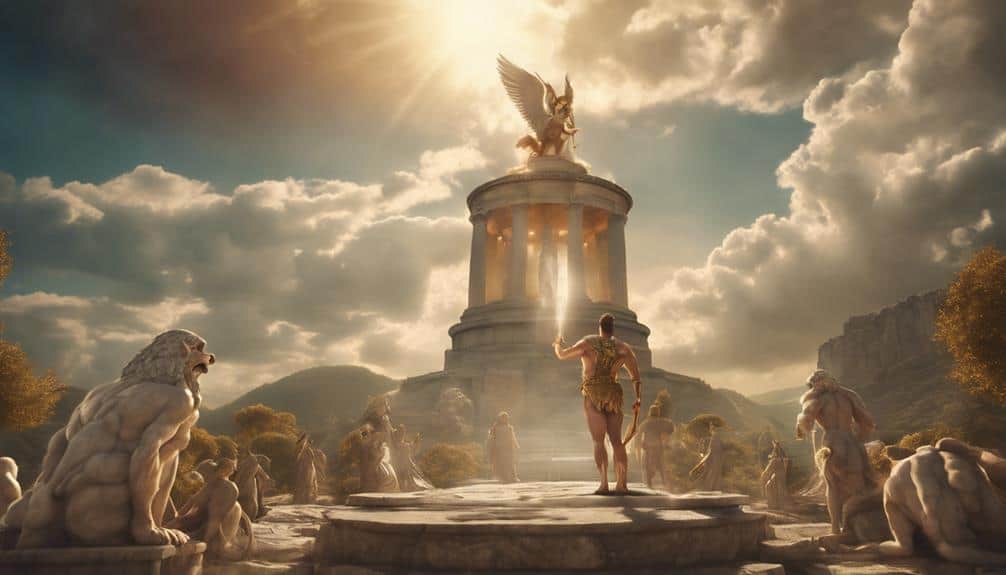
As you explore Schwab's retelling of Greek mythology, you'll encounter legendary heroes on epic quests and gods entangled in complex relationships.
Prometheus's defiance, Odysseus's cunning, and Hercules's strength highlight the enduring appeal of these tales.
Each narrative not only entertains but also offers insight into ancient Greek values and their timeless cultural impact.
Legendary Heroes' Epic Quests
In ancient Greek mythology, the epic quests of heroes like Hercules, Theseus, and Jason reveal a rich tapestry of courage, cunning, and divine intervention. These legendary heroes set out on mythical adventures that tested their limits and defined their legacies.
Hercules, known for his incredible strength, faced twelve arduous labors, each presenting seemingly insurmountable challenges—from slaying the Nemean Lion to capturing the elusive Golden Hind. Theseus, the Athenian hero, journeyed into the labyrinth to confront the fearsome Minotaur, relying on both his bravery and intellect to navigate the maze and secure victory.
Jason's quest for the Golden Fleece exemplifies the trials and triumphs of Greek mythology. With the Argonauts by his side, he encountered perils such as the Clashing Rocks and the dragon guarding the fleece, showcasing his leadership and tenacity. Perseus, another iconic hero, set out on a daring mission to slay Medusa, using clever tactics and divine gifts to achieve his goal.
Meanwhile, Achilles and Odysseus stand as paragons of heroism in the Trojan War and its aftermath. Achilles' prowess in battle and Odysseus' cunning mind during his arduous journey home highlight their epic quests' enduring allure and complexity.
Timeless Gods' Complex Relationships
Countless myths within ancient Greek mythology unravel the intricate and often volatile relationships among gods like Zeus, Hera, and Poseidon, revealing their complex family dynamics and power struggles. As the king of the Olympian deities, Zeus wielded immense power but faced constant challenges from both his siblings and offspring.
Hera, his wife and sister, frequently clashed with Zeus over his numerous infidelities, resulting in legendary tales of revenge and jealousy that permeate their myths. Poseidon, Zeus' brother and god of the sea, often found himself at odds with Zeus regarding dominion over various domains. Their rivalry extended to the mortal world, influencing significant events such as the Trojan War.
These complex relationships among the Greek gods didn't just highlight their divine power but also mirrored human emotions and conflicts, making their stories timeless and relatable. The myths surrounding these iconic figures illustrate the perpetual power struggles and familial tensions that defined the pantheon of Olympian deities.
From Hera's cunning schemes to Poseidon's tempestuous wrath, the family dynamics among these gods were anything but harmonious. By examining these relationships, you gain a deeper understanding of the timeless themes of love, betrayal, and heroism in Greek mythology.
Interpretations by Gustav Schwab
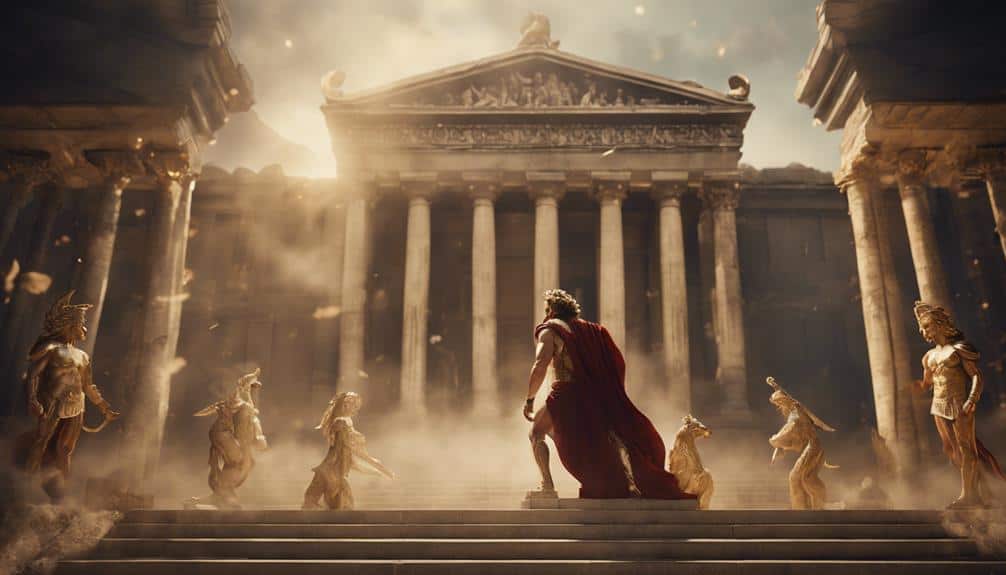
Gustav Schwab's interpretations of Greek mythology captivate readers with their detailed narrative and engaging storytelling. His book weaves ancient fables into a cohesive narrative, drawing from various sources to create interpretations that are both clear and accessible. By doing so, Schwab makes the complex and diverse nature of Greek mythology approachable for both novices and scholars.
Schwab's strength lies in his ability to bring ancient myths to life through:
- Vivid storytelling: He paints a rich tapestry of gods, heroes, and epic adventures.
- Comprehensive coverage: Schwab incorporates a wide range of myths, ensuring a broad understanding.
- Engaging narrative: His style keeps readers invested in the tales, making ancient stories feel modern and relevant.
However, it's important to note that Schwab's version sometimes streamlines the diverse nature of Greek mythology. In his quest for cohesive storytelling, he might sideline certain variations and interpretations of the myths. This approach makes the myths more digestible but can occasionally sacrifice the multifaceted complexity inherent in the original stories.
Influence on Western Culture
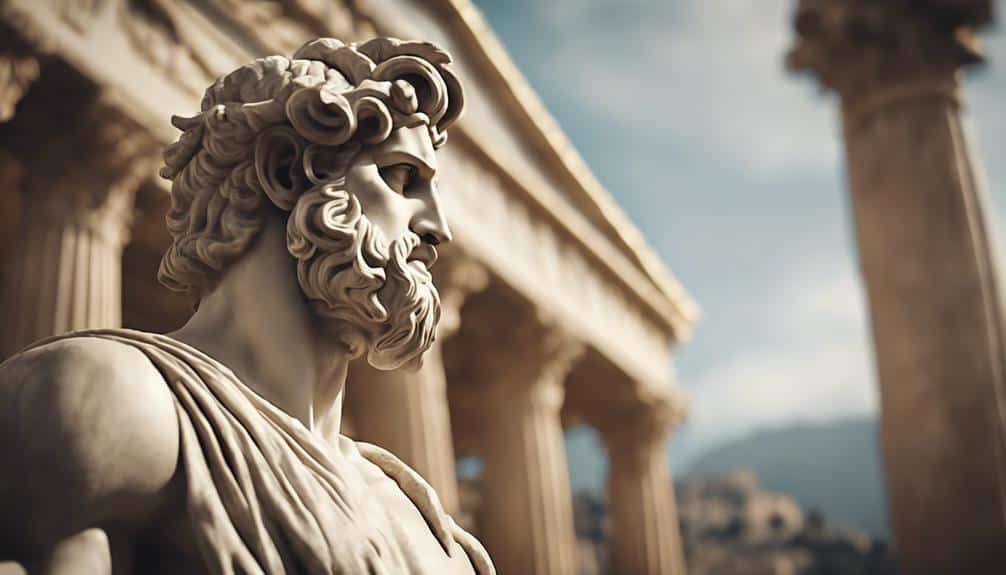
Greek mythology has deeply permeated Western culture, shaping artistic expressions, philosophical inquiries, and narrative structures that continue to resonate today. You can see its enduring relevance in various forms of art, from classical paintings and sculptures to contemporary novels and films. These myths have provided a rich source of inspiration, allowing artists to explore complex themes and human emotions through the lens of ancient stories.
In literature and storytelling, Greek mythology's influence is undeniable. The heroes and gods of ancient Greece serve as archetypes, embodying universal ideals, virtues, and flaws that resonate with audiences across generations. These characters often reflect aspects of human nature, offering insights into morality and the complexities of the human condition. For instance, the trials of Hercules or the wisdom of Athena provide timeless narratives that continue to inform modern storytelling techniques.
Moreover, the philosophical and ethical questions raised by Greek myths have shaped Western thought, prompting reflections on human nature and morality. Whether through the tragic fate of Oedipus or the heroic journey of Odysseus, these stories challenge us to ponder our own values and the consequences of our actions, making Greek mythology an integral part of Western cultural heritage.
Recommended Readings

If you're interested in exploring the abundant world of ancient myths, 'Gods and Heroes of Ancient Greece' by Gustav Schwab offers a detailed and accessible retelling of these timeless stories. This collection of myths delves into the lives of iconic figures such as Prometheus, Helen of Troy, and Odysseus, providing readers with a thorough understanding of Greek mythology's cultural legacy. Schwab's storytelling style ensures that the classic tales are engaging, making this book a valuable addition to your English Literature collection.
Schwab's work stands out for its:
- Historical accuracy: Schwab meticulously aligns his narratives with ancient sources, offering a faithful representation of Ancient Greece's mythology.
- Reader-friendly format: The clear and engaging retellings make complex stories accessible to readers of all ages.
- Educational value: This book serves as an excellent reference for both enthusiasts and scholars interested in Greek myths.
In the domain of recommended readings, 'Gods and Heroes of Ancient Greece' remains essential. By combining meticulous research with enchanting prose, Schwab breathes new life into these classic tales. Whether you're new to Greek myths or seeking a deeper understanding, this book is a must-read for anyone intrigued by the ancient world.
Engaging With Mythology Today

Engaging with mythology today reveals the profound influence these ancient stories still exert on modern culture, from literature and art to popular media and education. Greek mythology, with its captivating storytelling and vivid illustrations, continues to enchant audiences of all ages. The enduring cultural legacy of these tales, featuring Olympian gods and heroes, remains evident as they're woven into the fabric of contemporary narratives.
For young readers, these legendary tales of epic adventures like the Odyssey and the Trojan Wars offer a mesmerizing visual feast. The intricately designed CGI scenes and mythical characters stimulate children's imagination, making the ancient stories come to life. By delving into the world of Greek myths, children not only enjoy the rich narratives but also gain insights into historical and cultural contexts.
Moreover, the timeless appeal of Greek mythology extends far beyond books. It permeates films, video games, and even classroom curriculums, ensuring these myths remain relevant. As you explore these stories, notice how they inspire creative interpretations and adaptations, keeping the essence of these epic adventures alive.
Ultimately, engaging with Greek mythology today means appreciating its powerful impact on our collective imagination and cultural heritage.


